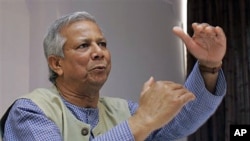In 1976, an economics professor in Bangladesh, Muhammad Yunus, discovered that a very small loan, issued on fair terms, could make an enormous difference to the poorest of the poor and their ability to make a living. He lent $27 of his own money to 42 women who supported themselves by manufacturing and selling handicrafts, so they could purchase supplies. Free from the exorbitant rates charged by money lenders, the women made a profit and returned the loan with interest.
This was the idea behind Grameen Bank, which became an independent institution in 1983. Today it has some 9 million borrowers, over 95 percent women. The Bank’s customers hold 94 percent of the shares in the bank, while the government of Bangladesh holds the remaining 6 percent.
In recognition for “their efforts to create economic and social development from below,” Muhammad Yunus and Grameen Bank were jointly awarded the 2006 Nobel Peace Prize, and numerous other prizes including the Independence Day Award, the highest civilian accolade in Bangladesh.
Nonetheless, last year, the government of Bangladesh, citing the country’s mandatory retirement age of 60, removed the then-70 year old Mr. Yunus from his post as managing director of Grameen Bank.
In late May, the Government of Bangladesh declared that it intends to form a commission to investigate the legal status of Grameen Bank and its affiliated businesses. The commission will also consider "future steps to be taken about Grameen Bank and its affiliates."
The United States is concerned over this turn of events, and urges the government of Bangladesh to take no action that would weaken the effectiveness of Grameen Bank, which continues to be a source of hope for Bangladesh’s most vulnerable, particularly women.
“The world has been especially inspired by the work of the Grameen Bank,” said Secretary of State Hillary Clinton during her recent visit of Bangladesh, “which has unleashed the potential of millions of women in Bangladesh and around the world to not only improve their own livelihoods, but also contribute to long-lasting economic growth in their communities and countries. And I look forward to Grameen Bank carrying on its good work for a long time to come.
In Support Of Grameen Bank

The U.S. urges the government of Bangladesh to take no action that would weaken the effectiveness of Grameen Bank.



